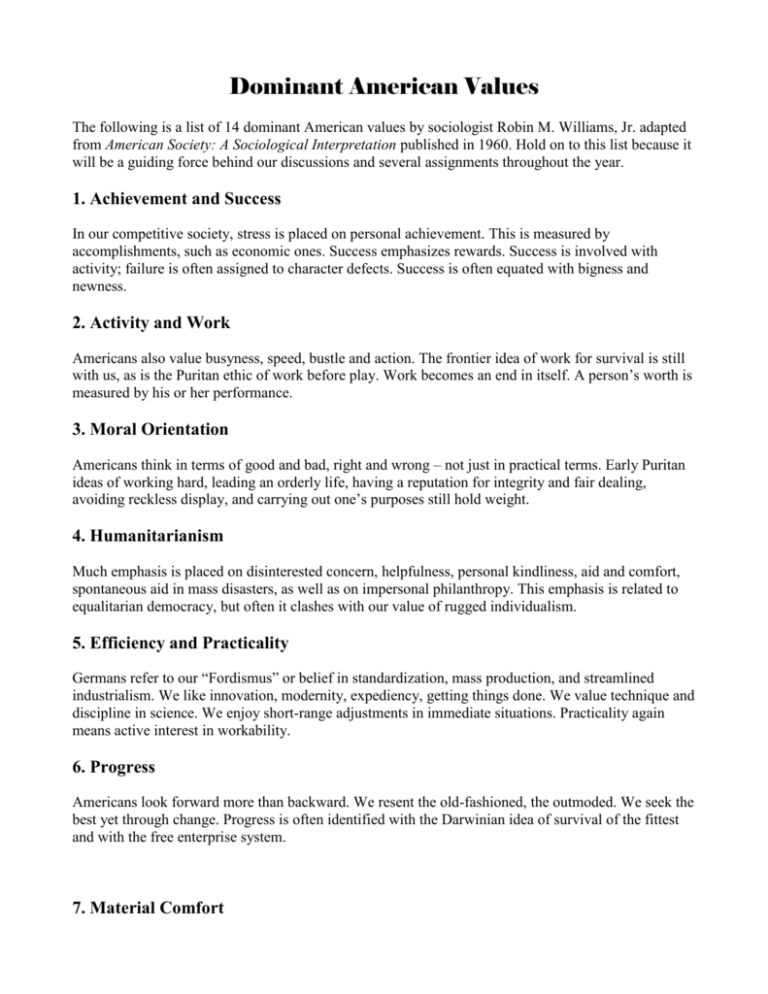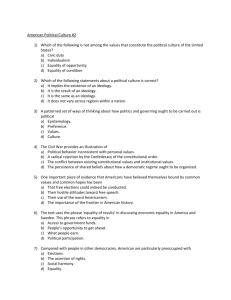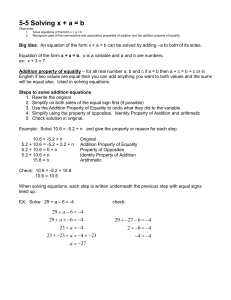Dominant American Values
advertisement

Dominant American Values The following is a list of 14 dominant American values by sociologist Robin M. Williams, Jr. adapted from American Society: A Sociological Interpretation published in 1960. Hold on to this list because it will be a guiding force behind our discussions and several assignments throughout the year. 1. Achievement and Success In our competitive society, stress is placed on personal achievement. This is measured by accomplishments, such as economic ones. Success emphasizes rewards. Success is involved with activity; failure is often assigned to character defects. Success is often equated with bigness and newness. 2. Activity and Work Americans also value busyness, speed, bustle and action. The frontier idea of work for survival is still with us, as is the Puritan ethic of work before play. Work becomes an end in itself. A person’s worth is measured by his or her performance. 3. Moral Orientation Americans think in terms of good and bad, right and wrong – not just in practical terms. Early Puritan ideas of working hard, leading an orderly life, having a reputation for integrity and fair dealing, avoiding reckless display, and carrying out one’s purposes still hold weight. 4. Humanitarianism Much emphasis is placed on disinterested concern, helpfulness, personal kindliness, aid and comfort, spontaneous aid in mass disasters, as well as on impersonal philanthropy. This emphasis is related to equalitarian democracy, but often it clashes with our value of rugged individualism. 5. Efficiency and Practicality Germans refer to our “Fordismus” or belief in standardization, mass production, and streamlined industrialism. We like innovation, modernity, expediency, getting things done. We value technique and discipline in science. We enjoy short-range adjustments in immediate situations. Practicality again means active interest in workability. 6. Progress Americans look forward more than backward. We resent the old-fashioned, the outmoded. We seek the best yet through change. Progress is often identified with the Darwinian idea of survival of the fittest and with the free enterprise system. 7. Material Comfort Americans enjoy passive gratification – drink this, chew that, take a vacation. We enjoy happy endings in movies. We enjoy consumption, and our heroes before 1920 were more from social, commercial, and cultural worlds of production. After the 1920s the heroes came more from the leisure-time activities of sports and entertainment. Yet Americans also enjoy culture and engage in do-it-yourself hobbies and vacations. 8. Equality Our history has stressed the equality of opportunity, especially economic opportunity. We feel guilt, shame, or ego deflation when inequalitarianism appears. While discrimination exists, much lip service is paid to formal rights, legal rights. Equality is not a pure concept but is largely two-sided: social rights and equality of opportunity. 9. Freedom Americans also seek freedom from some restraint, having confidence in the individual. Freedom enters into free enterprise, progress, individual choice, and equality. It has not meant the absence of social control. 10. External Conformity Americans also believe in adherence to group patterns, especially for success. Economic, political, and social dependence and interdependence call for some conformity. If all people are equal, each has a right to judge the other and regulate conduct to accepted standards. 11. Science Americans have faith in science and its tools. Science is rational, functional, active. Science is morally neutral. It adds to our material comfort and progress. 12. Nationalism / Patriotism Americans feel some sense of loyalty to their country, its national symbols, and its history. Foreigners observe how we value our flag and our national anthem, how we believe that America is the greatest country in the world. 13. Democracy Americans have grown to accept majority rule, representative institutions, and to reject monarchies, aristocracies, and dictatorships. We accept law, equality, freedom. 14. Individualism We protect our individualism by laws and by the belief in one’s own worth.











